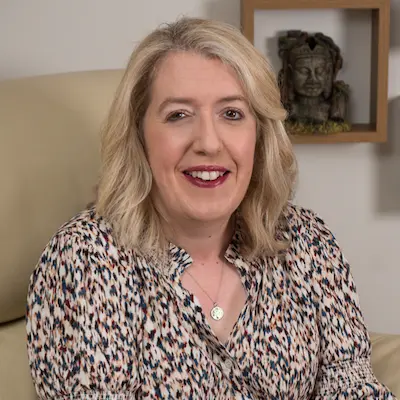The article below is a version of the video interview I gave above.
Introduction
I’m Alison, a trained psychotherapist. I run Formby Counselling near Liverpool in the UK. I have my therapy rooms there which are also available to rent by other counsellors.
I also cover Southport, Ormskirk, Skelmersdale, Wigan, Warrington, St Helens, Prescot. Being close to the beach and a beautiful nature reserve I also offer “Walk and talk” eco-therapy.
What’s your experience helping people to cope with loss?
Many clients come to therapy after experiencing major losses in their lives through death, relationship breakdown and divorce, failing health and lost jobs, homes, and pets.
The German psychiatrist and psychotherapist, Fritz Perls, said that working with grief and loss was primarily about unfinished business and he pioneered the use of the Gestalt therapy empty-chair technique with clients in the 1960’s.
What is the empty-chair technique is and how it can help with grief?
I have an empty chair in the therapy room facing the client, and I ask them to imagine, for example, the person they have lost sitting in the empty chair. I ask the client to describe their feelings to the lost person and say the things they, perhaps, never got the chance to say before the loss.
Fritz Perls said that the resolution of grief and loss involves expressing both old resentments and appreciations about the lost person, as it is the unexpressed love, gratitude, admiration, appreciation, anger and resentments that creates the unfinished business of long-term, protracted grief.
Some clients find it difficult to imagine the lost person sitting in the chair and imagining talking to them because they fear the lost person might have rejected them or made fun of them.
For these clients, I ask them to tell me what they didn’t get the chance to say to the lost person as a way to resolve the unfinished business of grief in the therapeutic relationship between myself and the client.
What advice would you give to someone who is coping with loss or grief?
The first piece of advice I would give is to allow yourself to feel the whole range of your emotions. Grief is a natural process of life and human relationships, and it’s important to give yourself permission to feel sadness, anger, resentment, love, gratitude, admiration, and appreciation as they arise.
The second piece of advice is to seek support. Whether it’s through talking with friends and family, joining a support group, or seeking the help of a qualified therapist, it’s important to have a support system in place to help you navigate the grieving process.
Are there any other techniques you’ve used in therapy to help with grief?
Another technique is to use mindfulness to help clients develop greater self-awareness and acceptance of the whole range of their emotions.
We might use techniques such as meditation or breathing exercises to help clients become more present in the moment and develop a greater sense of peace and calm. It is so important for grieving clients to simply tell their individual stories of loss and be heard and validated.
How long does the grieving process typically last, and when should someone seek help?
The grieving process is different for everyone, and there’s no set timeline for how long it lasts.
However, long-term, protracted grief can cause a person to emotionally withdraw from relationships, frequent bouts of irritability or anger, an inability to feel any emotions at all, confusion, obsessional thoughts, a fear of losing control, depression, indifference, and anxiety. It is important to seek therapy particularly in this type of grief.
What challenges have you encountered in helping clients cope with grief?
One challenge is that grief can be a very individual process, and what works for one person may not work for another. It’s important to tailor the therapy to the client’s specific needs and circumstances.
Another challenge is that grief can be a very painful and difficult process, and it can be hard to confront the emotions that arise, and also for clients to make significant meanings out of losses. However, within the safe, confidential, empathic, therapeutic relationship between clients and their therapists, it’s possible
to work through these challenges and to make meaning out of grief and loss.
Personally, I find the lyrics to Duran Duran’s song ‘Ordinary World’ so meaningful when processing my own grief and losses, as it was written as a tribute to the lead singer, Simon Le Bon’s friend who passed away in 1986.
These words, ‘Still I can’t escape the ghost of you’ and ‘There’s an ordinary world, somehow I have to find’ have always so moved me emotionally, as I feel the unfinished business of grief is also about finding a new ‘normal’ life after loss.
